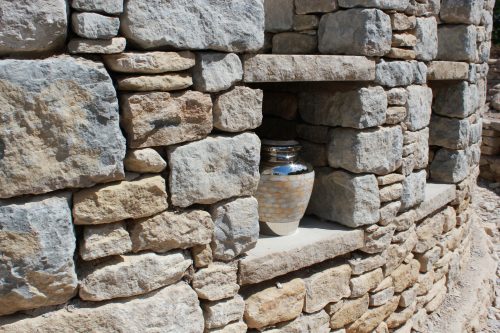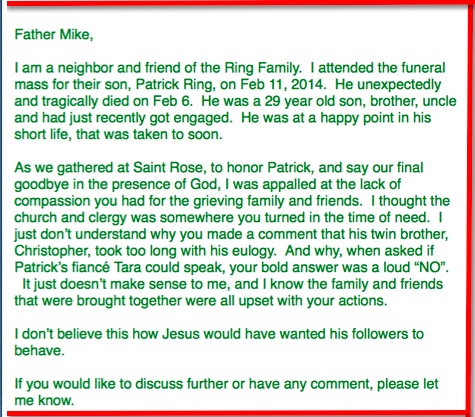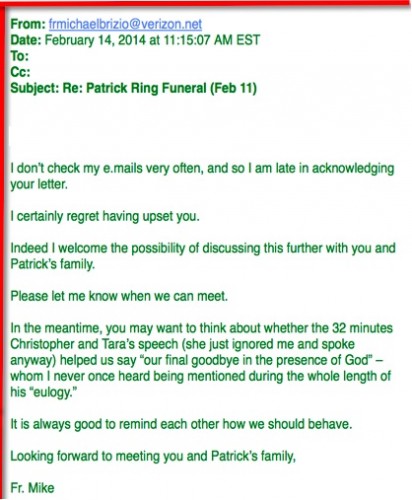As Jenny Uzell embarks on a series of posts which will consider the knotty question, What Is A Funeral For? it’s worth reflecting on what has been a game of two halves, funeralwise, in the last fortnight. Two people have expressed contrasting approaches to a funeral.
First, there was Dave Smith, who arranged the funeral of his daughter, Hannah, the 14-year-old who committed suicide after being bullied online. Desperately sad though this was, Dave wanted the funeral to celebrate Hannah’s life, and he asked mourners and relatives to wear colourful clothes, onesies, her favourite garment, in particular, to reflect Hannah’s joie de vivre.
The church was decorated with purple and white balloons, photographs of Hannah, and a poster that read “Be Happy for Hannah”. Purple was Hannah’s favourite colour. Her coffin was purple. Her father did not want her to travel in a hearse, so he brought her himself in a blue Audi 4×4. The coffin was carried into church to In The Air Tonight by Phil Collins. The service was conducted by the Church of England vicar, the Rev Charlie Styles, who described the proceedings as informal and relaxed. Four hundred people came.
Hannah’s was a very zeitgeisty funeral, highly personal, focussed on positives. There were tears, yes, and there was also laughter.
At the other end of the scale, over in Ireland, the bishop of Meath, Dr Michael Smith, courted howling and outrage when he restated the Catholic church’s doctrinal ban on the personalisation of funerals. He outlawed eulogies. This embargo seems to be restated in a newsworthy way in a more or less five-yearly cycle. Since compromise is impossible, it is one that looks set to keep on coming round.
The good bishop’s rationale for resisting what he calls the dumbing down of funerals accords with Catholic dogma. In his words:
“The context of the funeral Mass in the church should be focused entirely on the celebration of the Eucharist. What we’re trying to do is focus on the essence of the Christian funeral rite. The essence is, of course, two things. One is to support the family, through prayer and the community, but also the other function of it is that we support the person on their journey to salvation. What we are trying to do then is maintain the integrity of the Eucharist.”
Can’t argue with that, can you? If you want to belong to the club, them’s the rules.
Both Dave Smith and the Bishop of Meath have very clear ideas about what they think a funeral should aim to accomplish, and how it should achieve it.
But the good bishop has other things to say about funerals that may be relevant to all of us. He says:
“I suppose that people’s understanding when they hear about a funeral is that they focus entirely on the funeral Mass but the rites of Christian funerals begin long before that. You have the vigil for the deceased, the wake house and the removal and, of course, the prayers of commendation at the graveside. So we’re saying look, there are opportunities for family members who want to pay a personal tribute to the deceased.”
He’s got a point, hasn’t he? Why do we feel that farewelling and remembrancing have to be packed into brief, bulging crem slot, leaving so much to be said in short order that, in order to get the biography recited and the grandchildren named, a celebrant must, with one eye fixed on the clock, zoom through a script at 360 words per minute, ruthlessly fading the music for prayer and/or reflection on the way?
Why do we place so much of a burden on the single event of the funeral ceremony? After all, there’s the time before it, as the bishop says. And there’s time afterwards — oh god, all that time afterwards.
That’s the time we need to focus on.
Secularists are neglecting to develop a case for the introduction of practices and rituals either side of the ceremony which might promote both good remembrancing and, also, the emotional health of bereaved people. This is probably why no celebrant association has made a public statement in support of the e-petition calling for statutory bereavement leave. That they haven’t is nothing short of astounding.
The Jewish practice of sitting shiva is a brilliant example of the sort of practice I’m talking about. For seven days following the funeral, the close family take a complete time out — stop the world, I want to get off: “The mourners experience a week of intense grief, and the community is there to love and comfort and provide for their needs.” Find more here.
Jews mourn in a structured way for a year. Shiva is followed by three weeks of schloshim, a less intense mourning period, followed by further regulated re-entry into the world.
Like all rituals rooted in belief systems that have developed over hundreds of years, Jewish mourning is characterised by a thicket of impedimental ordinances, many of which strike outsiders as completely bonkers or, where gender equality is concerned, utterly unacceptable. For all that, the degree of difficulty they present is at the heart of the solace they offer. My friend Graham is presently saying the mourning kaddish daily for his father. It’s a short enough prayer. Translated, it reads:
Magnified and sanctified be God’s great name in the world which He created according to His will. May he establish His kingdom during our lifetime and during the lifetime of Israel. Let us say, Amen.
May God’s great name be blessed forever and ever.
Blessed, glorified, honored and extolled, adored and acclaimed be the name of the Holy One, though God is beyond all praises and songs of adoration which can be uttered. Let us say, Amen.
May there be peace and life for all of us and for all Israel. Let us say, Amen.
Let He who makes peace in the heavens, grant peace to all of us and to all Israel. Let us say, Amen.
Graham could mutter this while he waits for his kettle to boil or just think it as he brushes his teeth. But he’s not allowed to do that. No, he’s got to leg it down to the synagogue and recite it every day without fail at teatime in the presence of a minyan, a quorum of ten adult males. As a result, it rules his day. Everything is built around it. If he’s away on business he has to contact a synagogue before he’s even booked his flight in order to assure himself that there’ll be a minyan ready and waiting for him. Graham’s a man who has not been as observant as he might have been, in the past, but he’s doing his bit for his Dad, whom he loved. It’s hard work, he says, and it’s doing him a surprising amount of good.
Unglamorous work, isn’t it? Saying kaddish doesn’t fit with all those culturally untranslatable fun customs Brits get so bedazzled by, like the Dia de los Muertos (nobbut a lot of facepainting and larking about over here). Kaddish reminds us that mourning is a matter of hard yards.
The eulogy sandwich served up by celebrants is all very well in its way, but it’s not enough to nourish grief.
POSTSCRIPT: Jews are pro-eulogy. Here’s the halakhic ordinance:
Delivering a proper eulogy (hesped) is a major mitzvah. The mitzvah is to raise one’s voice and to speak heartrending words about the deceased in order to arouse the weeping of the audience, and to mention his praises … If one is negligent about the eulogy of an upright Jew one does not live long and is worthy of being buried alive.
It is forbidden to exaggerate excessively in praising the deceased. However, one is permitted to exaggerate slightly, as long as one does not go too far. If the deceased had no good qualities, one should not mention his character … If one attributes good qualities to someone who did not possess them at all, or excessively exaggerates the good qualities he had, this causes evil to the speaker and to the deceased.
Source



